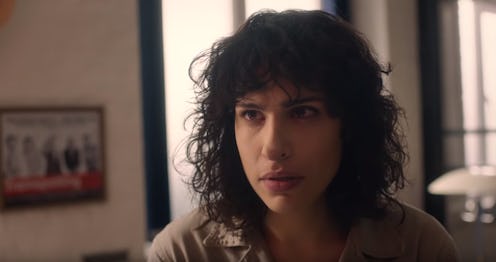Life
As A Bisexual Woman, These Two Scenes In ‘The Bisexual’ Feel Like A Revelation
Bisexual people tend to get left out of the conversation in TV shows and movies, and that’s because there are a lot of tired myths about bisexuality out there. Like bisexual people simply don’t exist (‘scuse me, I’m standing right here), they’re all into threesomes, and they’re "straight" when they're in different-sex relationships. But Desiree Akhavan’s dramedy series The Bisexual powerfully crushes a lot of those myths. But as a cisgender bisexual woman, the show is so powerful to me because it shows a queer experience I can finally relate to. And while the whole six-episode series is completely marathon-worthy, there are two scenes that really hammered home why this show is so important for bisexual representation.
In the series, Akhavan plays Leila, a woman who has recently broken up with her girlfriend Sadie (Maxine Peake), then struggles to come out as bisexual after having previously identified as a lesbian. Leila struggles with her bisexuality throughout the series, telling her straight, male roommate Gabe (Brian Gleeson), "When I hear bisexual, I think lame slut. It’s tacky, it’s gauche, it makes you seem disingenuous. Like your genitals have no allegiance, you know? Like you have no criteria for people; just an open door policy."
In episode one, one scene that really affected me was when Leila goes to a lesbian bar with Gabe and her friends right after the break-up. The conversation suddenly turns to bisexuality after one of her friends is accused of sleeping with straight girls, and Leila's friend says she thinks the supposedly straight women she's sleeping with are bisexual. But Leila's friends say these women aren't bisexual; they're just "sexual tourists," and they ask if anyone has ever actually met a bisexual. The group falls silent, and Leila finally answers quietly, "I'm pretty sure bisexuality is a myth. Yeah, that it was created by ad executives to sell flavored vodka." You can tell Leila is uncomfortable and is just saying what she thinks her friends want to hear.
While I was watching this scene, I just wanted to reach through the TV, pull Leila out of her seat, and hug her. Even on queer dating sites, one of the first questions people ask me is, “Are you really bisexual?” I often feel like people want me to prove my queerness to them. When you label yourself “bisexual,” it's almost a given that people will doubt your sexuality because that misconception of a “sexual tourist” or a “bi-curious” person who’s just out there experimenting is so real.
To me, it seemed like Leila was boxed into that all-or-nothing culture that forced her to hide her bisexuality from even her closest friends. The look on Leila’s face, this raw numbness, was so expressive of the daily erasure of bisexual people. The way Leila was silenced in this moment was so much more illustrative of biphobia and bi-erasure than any dialogue ever could be. It's so important for people who haven't had this experience to see how easily they might accidentally invalidate a loved one's entire identity.
Later in the series, Akhavan explores the complexities of sexual identity through a conversation in episode three between Leila and a younger queer woman named Francisca (Michèlle Guillot). Leila has her first experience having sex with a man, and Francisca doesn't understand why Leila feels like she needs to keep it a secret from her friends, who are lesbians. Leila tries to explain to Francisca that there's a generational gap that makes their identity experiences completely different.
"When you have to fight for it, I think that being gay can become the biggest part of you," Leila tells Francisca. "That you're gay, you're straight, and one comes with an entirely different lifestyle than the other, like different clothes, different friends, and you can't do both ... I don't know what it's like to grow up with the internet. I just get the sense that it's changing your relationship to gender and sexuality in a really good way, but in a way that I can't relate to."
Francisca demonstrates Leila's point so beautifully by simply telling Leila she thinks Leila is creating a problem where there isn't one. For Leila, sexual identity is rife with complexity and sacrifice. But for Francisca, sexual identity is just a small part of who she is — it doesn't define her.
This conversation just blew my mind as someone who came out really recently. There is so much to unpack in just a few sentences, like the generational experiences of sexual identity, the varied coming-out experiences, how the internet has affected the world's view of gender and sexuality, how sexuality affects people's lived experiences, and so much more.
What struck me the most about this scene was this idea of how my identity might change after coming out as bisexual at 30-something. I already thought I knew who I was, so it was incredibly confusing and really scary to suddenly not be sure who I was attracted to. And if I was bisexual, what did that mean about me? How was that going to change me, if at all? This conversation between Leila and Francisca touched on that confusion and fear in such a real way that validated my feelings during that time of my life.
Akhavan's series couldn't have come at a better time for me. It showed me that I don't have to represent queerness in any specific way, and that I can just let my attractions take me wherever they lead me. It's such an important experience for people to have, especially if you're questioning your sexuality in any way. There are so many ways to experience attraction, so mainstream media needs to catch up to how complex sexual identity really is.
